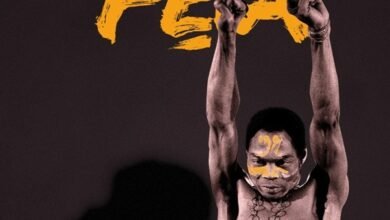Rachid Sguini aka Rakidd : ” The power of drawing, which in five strokes can say a lot and touch people”

Known for his « gribouillages » (doodles), Rakidd , whose real name is Rachid Sguini, is multiplying the publication of illustrated books. The Franco-Moroccan writer and illustrator now publishes other atypical artists, particularly from the diaspora.
By Merieme Alaoui
In his latest book, « Souvenirs du bled »*, the old postcard-style pages bring to life the memories of the overwhelming majority of children of North African immigrants. Driving to Bled in a Renault 21, the bulls on the Spanish roads, the watermelons, the over-sweetened lemonades, the old card games… It’s not surprising that the Franco-Moroccan cartoonist has received many responses from readers who come from or were born in the Maghreb and even beyond. « I have been told over and over again how these memories bring back emotions. Family anecdotes, with relatives living or dead. For others, it was a way of communicating with the older generation through drawings, » says Rachid Sguini.
« Without realizing it, I was reaching an important audience, from the diaspora or close to this immigrant youth. There was a big gap there »
This is, indeed, Rakidd’s style, that of a sometimes-nostalgic adult who looks at the world with humor without ever silencing his childlike soul. Born in 1988 in Le Puy-en-Velay, in the heart of the Auvergne, he has always had a pencil in his hand to doodle. « As long as I can remember, I have always wanted to draw, » he says. His « 100% Amazigh » family, from the town of Khénifra in the Moroccan Middle Atlas, encouraged him to pursue his passion. So much so that, unsurprisingly, he enrolled at the Bellecour art school in Lyon with a literary baccalaureate in drawing. « It was an intense rhythm, I found myself with other enthusiasts like me and we surpassed ourselves.” He graduated as a graphic designer and quickly became interested in communications. But the real turning point in his career was the publication in 2012 of his blog « Les Gribouillages de Rakidd », which is shared on social media (it gathers a community of more than 150,000 people). His little tablets, sometimes spicy, often funny, drawn in response to current events or the mood of the moment, often go viral. « Without realizing it, I was reaching a fairly large audience, from the diaspora or close to this immigrant youth. There was a big gap there ».
He moved to Paris to develop his network. He worked with Gulli television, wrote sketches for Canal + and carried out communication assignments. After a few years, still convinced of the power of drawing, which « in five strokes can say a lot and touch people », he wants to write more and be published. To have a much stronger impact and leave a mark ». « And then I always imagined that one day I would find my books in the municipal library of the town where I grew up, where I used to spend whole afternoons reading and dreaming, » he says smiling. But above all, he wanted to get away from Facebook and Instagram, which could « turn off the tap » overnight.
« If Moroccans can focus on art, it is because the country is more stable today »
He signed his first publishing contract with Ouafa Mameche, founder of Faces cachées édition. He was asked to resume his pencil drawings of 35 events from 2001 to 2016. His other illustrated albums (Le petit manuel antiraciste pour les enfants (mais pas que !!!); Souvenirs du bled), published by Edition Lapin, have been reprinted several times. He has even gone over to the other side by taking over a collection from the same publisher. « It’s about publishing new, let’s say atypical authors, with a different profile and discourse. I was clearly asked to find talents with a new imagination, stories different from those we have seen too much of. He cites the example of a veiled illustrator or an author with a mental illness…
Very close to Morocco, Rachid Sguini claims his two nationalities. And he intends to develop artistic projects between his two homelands. « I have to go there very regularly, and each time I notice that more and more museums and artists are emerging. If Moroccans can focus on art, it is because the country is more stable today. So much so that some of his close Franco-Moroccan friends have even decided to settle there. « After the COVID-19 experience and the discovery of remote working, which is easier for certain professions, the idea of being between « here and there » is certainly gaining ground, » admits Rakkid.

*“Souvenirs du bled” Edition du Lapin, 2022






